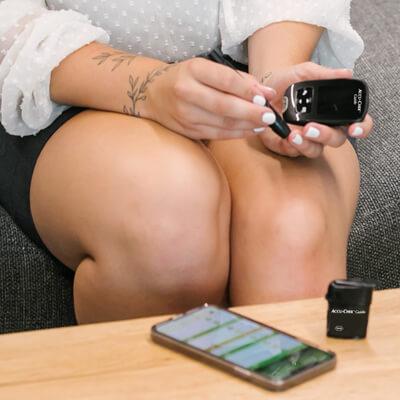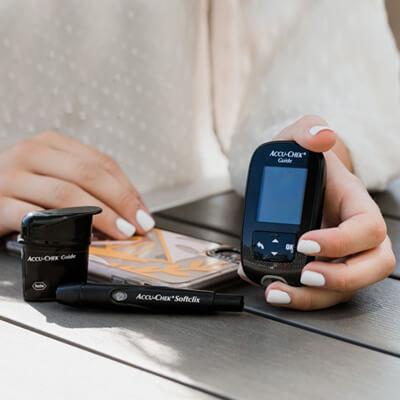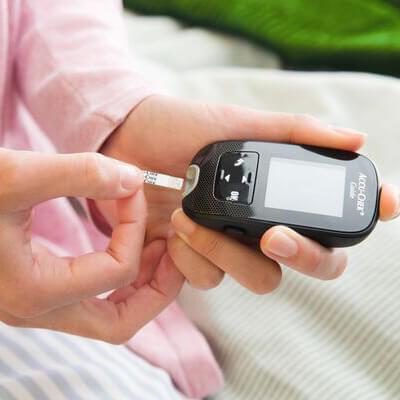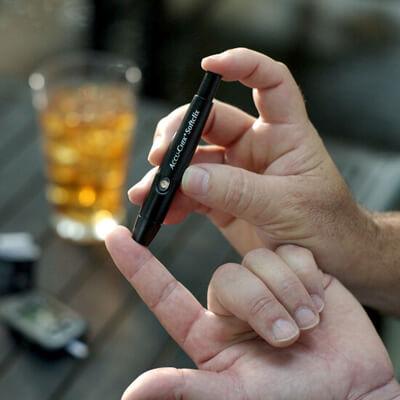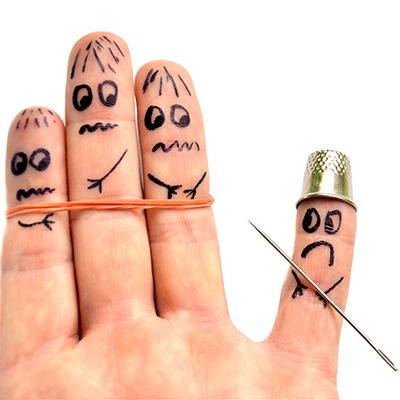Aim for better, not perfect
Guest article by Riva Greenberg. Let's dispel a diabetes myth right now—the idea that you can manage your diabetes and blood sugar perfectly. You can't. There are so many tasks involved in managing diabetes and blood sugar that you will not be able to do them all, every day, with absolute success. For example, you won't eat perfectly all the time. There will be times an event will prevent you from being active. You may forget to take your medicine or log your blood sugar every now and then. Further, while we know keeping our blood sugar in the recommended target range helps delay or prevent diabetes...
Read MoreHow do I track blood glucose levels easily?
A simple tool to understand your blood glucose results The Accu-Chek® Testing in Pairs Tool - a simple, 7-day paper tool 7 days to help you track your blood glucose levels Accu-Chek Testing in Pairs is a simple tool that helps you track your blood glucose. Use it before and after a specific meal. Use it around physical activity. Or, use it for other events to understand how your blood glucose levels change across different activities....
Read MoreWhat is A1c?
Your A1c number Consider your A1c number (also known as "HbA1c" or "glycated hemoglobin") as a snapshot of your blood glucose levels over two to three months. Over time, glucose naturally attaches itself to your red blood cells. When this happens, the cell is considered "glycated". The more glucose in your blood, the more glycated A1c you have in your cells. What’s an optimal A1c number? The recommended A1c target for a person living with diabetes is 7% or lower—some people...
Read MoreTips for making blood glucose monitoring easier
Whether you check your blood glucose level once a week, once a day or 6 times a day, learning how to make checking easy and less painful may inspire you to monitor more often. For people living with diabetes, the knowledge that you gain from checking your blood sugar is the key to staying in management of your health. It helps you make informed decisions about medicine, food and exercise. It helps you cope with the day-to-day demands of living with diabetes; you’ll feel better each day and you’ll lower your risk for future diabetes complications....
Read MoreBlood Glucose Test Results Help You Take Control
Benefits of monitoring your blood glucose Monitoring your own blood glucose helps you take control of your health, especially once you learn what your test result numbers mean and what you can do with them. A recent clinical research, the Structured Testing Program (STeP), offers the proof. The study concluded that collecting, visualizing and understanding the data of blood sugar test results and focusing treatment based on that data significantly reduced the A1c levels of poorly managed, non insulin-treated type 2 diabetes over a 12-month period. ...
Read MoreClixmotion Technology
In gently, out under precise control. Only Accu-Chek lancing devices feature Clixmotion® technology, the principle of dual-guided motion that helps prevent vibration and oscillations while lancing.1, 2 In the skin, the lancet is brought to a gentle stop, referred to as Soft Stop, and then actively retracted immediately in a linear motion. This fast, controlled motion is...
Read MorePain management
5 tips for gentle and virtually pain-free blood sampling Lancing fingers is a vital part of your daily diabetes management. In a recent study, finger soreness and pain were most reported as the main reason people living with diabetes refrain from regular blood glucose testing. One factor contributing to greater pain sensation when lancing the finger is wrong handling of the lancing device. Lancing correctly with Accu-Chek® lancing devices keeps discomfort to a minimum. You can monitor more comfortably with these five easy steps: ...
Read MoreDo Injections Give You The Needle?
Trembling, palpitations, cold sweats, nausea, or even a blood pressure drop: do needles have that effect on you? You can’t get away from it: blood sugar checking and insulin injections rhyme with needle sticks. Yet, the stress caused by a fear of needles can cause your blood sugar to spike, and on top of all that, your skin’s surface can suddenly become hypersensitive—ouch! What a way to make matters even worse! Conquering trypanophobia Trypa… what? Trypanophobia is the extreme fear of needles...
Read More6 secrets to enjoying weddings (without your numbers going crazy)
If June is supposed to be wedding month, then why are all of your August weekends booked with stag and stagette dos, and nuptials from morning to night? The trend has shifted, with more Canadian weddings taking place in August than any other month.1 You've already seen advice on managing diabetes at weddings and parties, so we'll skip the obvious (eat before you go! drink water!). Instead, here are some ideas for having fun without regretting it an hour later (or the next morning). 1. Raise your Champagne glass! You don't have to skip alcohol just because you have diabetes. Just keep it in...
Read MoreHow do I track blood glucose levels easily?
A simple tool to understand your blood glucose results The Accu-Chek® Testing in Pairs Tool - a simple, 7-day paper tool 7 days to help you track your blood glucose levels Accu-Chek Testing in Pairs is a simple tool that helps you track your blood glucose. Use it before and after a specific meal. Use it around physical activity. Or, use it for other events to understand how your blood glucose levels change across different activities....
Read MoreWhat is A1c?
Your A1c number Consider your A1c number (also known as "HbA1c" or "glycated hemoglobin") as a snapshot of your blood glucose levels over two to three months. Over time, glucose naturally attaches itself to your red blood cells. When this happens, the cell is considered "glycated". The more glucose in your blood, the more glycated A1c you have in your cells. What’s an optimal A1c number? The recommended A1c target for a person living with diabetes is 7% or lower—some people...
Read MoreTips for making blood glucose monitoring easier
Whether you check your blood glucose level once a week, once a day or 6 times a day, learning how to make checking easy and less painful may inspire you to monitor more often. For people living with diabetes, the knowledge that you gain from checking your blood sugar is the key to staying in management of your health. It helps you make informed decisions about medicine, food and exercise. It helps you cope with the day-to-day demands of living with diabetes; you’ll feel better each day and you’ll lower your risk for future diabetes complications....
Read MoreBlood Glucose Test Results Help You Take Control
Benefits of monitoring your blood glucose Monitoring your own blood glucose helps you take control of your health, especially once you learn what your test result numbers mean and what you can do with them. A recent clinical research, the Structured Testing Program (STeP), offers the proof. The study concluded that collecting, visualizing and understanding the data of blood sugar test results and focusing treatment based on that data significantly reduced the A1c levels of poorly managed, non insulin-treated type 2 diabetes over a 12-month period. ...
Read MoreClixmotion Technology
In gently, out under precise control. Only Accu-Chek lancing devices feature Clixmotion® technology, the principle of dual-guided motion that helps prevent vibration and oscillations while lancing.1, 2 In the skin, the lancet is brought to a gentle stop, referred to as Soft Stop, and then actively retracted immediately in a linear motion. This fast, controlled motion is...
Read MorePain management
5 tips for gentle and virtually pain-free blood sampling Lancing fingers is a vital part of your daily diabetes management. In a recent study, finger soreness and pain were most reported as the main reason people living with diabetes refrain from regular blood glucose testing. One factor contributing to greater pain sensation when lancing the finger is wrong handling of the lancing device. Lancing correctly with Accu-Chek® lancing devices keeps discomfort to a minimum. You can monitor more comfortably with these five easy steps: ...
Read MoreDo Injections Give You The Needle?
Trembling, palpitations, cold sweats, nausea, or even a blood pressure drop: do needles have that effect on you? You can’t get away from it: blood sugar checking and insulin injections rhyme with needle sticks. Yet, the stress caused by a fear of needles can cause your blood sugar to spike, and on top of all that, your skin’s surface can suddenly become hypersensitive—ouch! What a way to make matters even worse! Conquering trypanophobia Trypa… what? Trypanophobia is the extreme fear of needles...
Read More6 secrets to enjoying weddings (without your numbers going crazy)
If June is supposed to be wedding month, then why are all of your August weekends booked with stag and stagette dos, and nuptials from morning to night? The trend has shifted, with more Canadian weddings taking place in August than any other month.1 You've already seen advice on managing diabetes at weddings and parties, so we'll skip the obvious (eat before you go! drink water!). Instead, here are some ideas for having fun without regretting it an hour later (or the next morning). 1. Raise your Champagne glass! You don't have to skip alcohol just because you have diabetes. Just keep it in...
Read More

